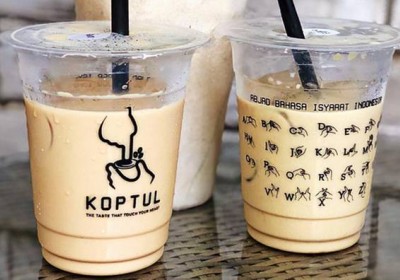Rejected Hundreds of Times, Deaf Friends Teaches Sign Language Through a Cup of Coffee
February 28, 2019
After being rejected hundreds of times, through a cup of coffee, deaf people can be empowered, while campaigning equality and sign language to hearing friends.
Three deaf friends: Trierwinsyah, Putri Sampaghita Trisnawinny Santoso, and Mohamad Adhika opened a coffee shop called ‘Tuli (Deaf) Coffee', or Koptul. Established since May 2018, Kopi Tuli has two outlets in Limo, Depok, and Duren Tiga, South Jakarta. The customers are diverse, both deaf and hearing (non-deaf) people.
"We use the name Kopi Tuli, an Indonesian name. Because if it is ‘coffee’ in English, many deaf friends do not understand what it is," said Erwin, short for Trierwinsyah, when interviewed in early February.
To facilitate communication with deaf friends and hearing friends, Tuli Kopi uses symbols containing hand gestures sign language. For example, A represents Kosu (milk coffee) Koso, B represents Kosu Wings, C represents Kosu Siput and 12 other types of coffee. Ordering instructions are placed above the cash register so that hearing customers can also read. Kopi Tuli coffee packaging also features sign language guide images.
Initially, Kopi Tuli was established because Putri and Dhika had difficulty in finding a job, while Erwin had just graduated from business college. They had submitted hundreds of applications. In fact, Putri did not give up and managed to send 500 job applications. But during the interview, the company rejected them after finding out that they were deaf. These three friends finally founded Kopi Tuli because they liked to hang out and drink coffee.
After being established, Kopi Tuli recruited employees who were also deaf. Erwin noted that there was a relatively balanced number of deaf customers and hearing customers. What’s more, this shop is also a place for anyone who wants to learn sign language.
Every day, one shop serves more than one hundred cups of coffee. Although they have recruited employees who are also deaf, Erwin and his colleagues often have to help to serve buyers in the shop.
In fact, not only the deaf coffee shop owners who trust deaf people to become a barista in their shop. KOPPI Head of Marketing, Ario Fajar, said that his shops also provided equal opportunities to deaf workers to join in their digital coffee shops. KOPPI collaborated with Handai Tuli when selecting employees and providing training for one month.
“In one KOPPI shop, at least there are two baristas. In the future, we want to provide opportunities for people with other disabilities," Ario said.
One of the deaf baristas at KOPPI, Nabila, said that her work was in accordance with her educational background while studying in hospitality major. While working, he also introduces the sign language and does awareness building campaign about disabilities to customers and fellow baristas.
"I was taught about coffee making by a hearing friend. In return, they asked to learn sign language," said Nabila.
Skills and Willingness is the Key
Law Number 8 of 2016 concerning Disability provides opportunities for persons with disabilities to get work. Private companies are required to recruit at least 1 percent of people with disabilities to be their employees, while government agencies must have at least 2 percent.
Acting chairperson of Center for Disability Studies of University of Brawijaya Disability Study, Slamet Tohari, said the government's duty was to ensure that the rules were implemented. Inclusiveness in the employment sector can be realized when infrastructure and systems in the workplace are accessible by persons with disabilities.
In addition to access, the key for persons with disabilities to work is skills and willingness. Nimas, a deaf barista at KOPPI, advises people with disabilities not to look for work that is beyond their capacity because it will only lead to depression which will impede on their performance. She encouraged people with disabilities to be more confident.
"Do not be afraid of being bullied or discriminated, do not easily give up because we are equal to them (read: people non-disabilities). Show that we can do work just like them, even better," said Nimas.
Chief Executive Officer of General Electric Indonesia, Handry Satriago, said people with disabilities can now access jobs than what it used to be in the past. Now, many applications can help people with disabilities to get information about work.
“The deaf, for example, cannot work in a field that requires telephone communication, but they can work at a computer or other place according to their talent. It is just a matter whether we are willing to do it or not," said Handry, who is in a wheelchair.
In order to support inclusive employment opportunities for persons with disabilities, the Indonesia Development Forum will welcome proposals containing inputs on this issue. The forum which is held by the National Development Planning Agency (Bappenas) and supported by the Australian Government through the Knowledge Sector Initiative will adopt the main theme Mission Possible: Seizing the Opportunities of Future Work to Drive Inclusive Growth.
IDF 2019 will bring together stakeholders, government and the private sector, to sit together and collaborate to find development policy solutions based on good research and practice. Please send ideas and initiatives about decent work and productive workers to the Indonesia Development Forum!
Indonesia’s Research Institutions Supporting the Development of the Electric Vehicle Industry
Indonesian Muslim Fashion and Cosmetics IKMs Shine at Dubai World Expo 2020
Govt Steps Up UMKM Transformation Efforts in the Midst of Pandemic Slowdown
Govt Encourages Promotion of IKM Products in Digital Era
Government Begins Developing Maritime Training Center in Makassar
Tweets by IDDevForum
